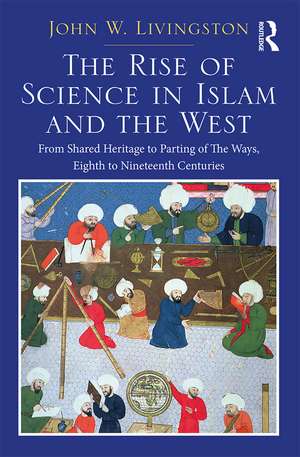Two Volume Set: In the Shadows of Glories Past and The Rise of Science in Islam and the West
Autor John W. Livingstonen Limba Engleză Hardback – 14 feb 2018
Preț: 1490.43 lei
Preț vechi: 1987.22 lei
-25% Nou
Puncte Express: 2236
Preț estimativ în valută:
285.19€ • 297.76$ • 236.03£
285.19€ • 297.76$ • 236.03£
Carte tipărită la comandă
Livrare economică 04-18 aprilie
Preluare comenzi: 021 569.72.76
Specificații
ISBN-13: 9781138299399
ISBN-10: 1138299391
Pagini: 1068
Ilustrații: 29
Dimensiuni: 155 x 235 mm
Greutate: 2.14 kg
Ediția:1
Editura: Taylor & Francis
Colecția Routledge
Locul publicării:Oxford, United Kingdom
ISBN-10: 1138299391
Pagini: 1068
Ilustrații: 29
Dimensiuni: 155 x 235 mm
Greutate: 2.14 kg
Ediția:1
Editura: Taylor & Francis
Colecția Routledge
Locul publicării:Oxford, United Kingdom
Public țintă
PostgraduateCuprins
Rise of Science in Islam and the West:
Part I Islam in Ascendance Preface 1 Historical Setting of the Great Age 2 The Record of Original Achievement 3 Science in a Religious Society 4 Al-Ghazali at the Crossroads Part II The Latin Connection: From Greco-Arab Classical to European Modern 5 The Latin Connections: Translation and Transmission 6 Latin Assimilation and Ascendancy 7 Renaissance and Revolution Part III From Muslim Empires in Rise and Fall to Western Ascendance 8 Military Ascendancy: 1258-1600 9 Prologue to Decline: The Past as Future 10 Military Misfortune and the Beginning of Scientific and Technical Transfer 1600-1722 11 The Tulip Period 12 Toward a New Order 13 The New Order Part IV Catching Up to the West: Science Assimilation in Cairo and Istanbul under Autocratic Reformers 14 The West’s Continuing Progress 15 Bonaparte’s Expedition: Savants, Shaykhs and the Institute d’Egypte 16 Muhammad Ali’s Militarization of Modernization and Educational Reform 17 Foreign Missions 18 Assessment of Muhammad Ali’s Reforms 19 Azharite Shaykhs and Modern Science 20 Intensification of Ottoman Reform under Sultan Mahmud II 21 Absolutist State Reformers vs. Young Ottoman Constitutionalists: The Young Turks and End of Empire
In the Shadows of Glories Past:
Part I Copernicus, Darwin and Islamic Intellectual Reform in the 19th Century 1 Post Muhammad Ali Reform in Egypt: Ali Mubarak’s Dar al-Ulum and Rawdat al-Madaris 2 Beirut: The American College and the Popularization of Science 3 Muqtataf, Rawdat al-Madaris and the Fikri Treatise on a Moving Earth 4 Darwin between Muqtataf and the American Evangelists 5 From Copernicus to Darwin 6 Shibli Shumayyil’s Darwin: A Theory for Everything Progressive 7 Scientific Interpretation: Shaykh Husayn al-Jisr and Darwin 8 Darwin between Sayyid Ahmad Khan’s Natcheriyya and Jamal al-Din al-Afghani’s Refutation 9 Muhammad Abduh 10 Abduh’s Legacy Part II Science, Society and Government in the Modern Muslim World 11 Overview of the 20th Century 12 Darwin at the Center of Debate 13 Inverse Appropriation: Science by Quran 14 Scientific Interpretation 15 Scientific Interpretation and Evolution 16 The Place of Al-Azhar and the Ulema 17 Science and the Contemporary State Epilogue
Part I Islam in Ascendance Preface 1 Historical Setting of the Great Age 2 The Record of Original Achievement 3 Science in a Religious Society 4 Al-Ghazali at the Crossroads Part II The Latin Connection: From Greco-Arab Classical to European Modern 5 The Latin Connections: Translation and Transmission 6 Latin Assimilation and Ascendancy 7 Renaissance and Revolution Part III From Muslim Empires in Rise and Fall to Western Ascendance 8 Military Ascendancy: 1258-1600 9 Prologue to Decline: The Past as Future 10 Military Misfortune and the Beginning of Scientific and Technical Transfer 1600-1722 11 The Tulip Period 12 Toward a New Order 13 The New Order Part IV Catching Up to the West: Science Assimilation in Cairo and Istanbul under Autocratic Reformers 14 The West’s Continuing Progress 15 Bonaparte’s Expedition: Savants, Shaykhs and the Institute d’Egypte 16 Muhammad Ali’s Militarization of Modernization and Educational Reform 17 Foreign Missions 18 Assessment of Muhammad Ali’s Reforms 19 Azharite Shaykhs and Modern Science 20 Intensification of Ottoman Reform under Sultan Mahmud II 21 Absolutist State Reformers vs. Young Ottoman Constitutionalists: The Young Turks and End of Empire
In the Shadows of Glories Past:
Part I Copernicus, Darwin and Islamic Intellectual Reform in the 19th Century 1 Post Muhammad Ali Reform in Egypt: Ali Mubarak’s Dar al-Ulum and Rawdat al-Madaris 2 Beirut: The American College and the Popularization of Science 3 Muqtataf, Rawdat al-Madaris and the Fikri Treatise on a Moving Earth 4 Darwin between Muqtataf and the American Evangelists 5 From Copernicus to Darwin 6 Shibli Shumayyil’s Darwin: A Theory for Everything Progressive 7 Scientific Interpretation: Shaykh Husayn al-Jisr and Darwin 8 Darwin between Sayyid Ahmad Khan’s Natcheriyya and Jamal al-Din al-Afghani’s Refutation 9 Muhammad Abduh 10 Abduh’s Legacy Part II Science, Society and Government in the Modern Muslim World 11 Overview of the 20th Century 12 Darwin at the Center of Debate 13 Inverse Appropriation: Science by Quran 14 Scientific Interpretation 15 Scientific Interpretation and Evolution 16 The Place of Al-Azhar and the Ulema 17 Science and the Contemporary State Epilogue
Notă biografică
John W. Livingston is Associate Professor of History at the William Paterson University of New Jersey, USA
Descriere
This is a study of science in Muslim society. The first volume starts at the rise of science in the eighth century and explores the efforts of nineteenth century Muslim thinkers and reformers to regain the lost ethos that had given birth to the rich scientific heritage of earlier Muslim civilization. The second volume reveals the undermining effect of European imperialism on western-oriented religious reformers and secular intellectuals, for whom science and political reform went together, and concludes with a chapter on the state of science in contemporary Muslim societies and the efforts to institutionalize science today.
